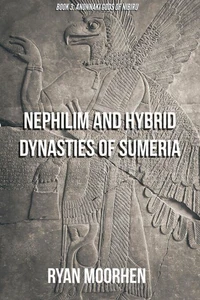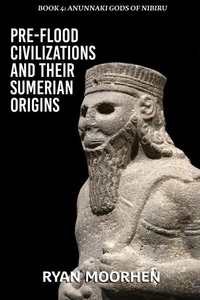The Enigma of Sumerian Gods
Par :Formats :
Disponible dans votre compte client Decitre ou Furet du Nord dès validation de votre commande. Le format ePub est :
- Compatible avec une lecture sur My Vivlio (smartphone, tablette, ordinateur)
- Compatible avec une lecture sur liseuses Vivlio
- Pour les liseuses autres que Vivlio, vous devez utiliser le logiciel Adobe Digital Edition. Non compatible avec la lecture sur les liseuses Kindle, Remarkable et Sony
 , qui est-ce ?
, qui est-ce ?Notre partenaire de plateforme de lecture numérique où vous retrouverez l'ensemble de vos ebooks gratuitement
Pour en savoir plus sur nos ebooks, consultez notre aide en ligne ici
- FormatePub
- ISBN8201327255
- EAN9798201327255
- Date de parution06/04/2022
- Protection num.pas de protection
- Infos supplémentairesepub
- ÉditeurJL
Résumé
The so-called descendant of the Elder God is often seen as a rival in such relationships. Many of his followers worship elder gods. During his lifetime, Nebo acquired something of a reputation as a god of wisdom, and it may have been because of this that he was able to stand apart from Merodach without becoming absorbed into the cult of the great Deity of Sumer. The writing was credited to him, as it was to all 'wise' gods.
His department interpreted the movements of the heavenly bodies. Nebo and his consort Tashmit were particularly popular as patrons of writing with the bookish King Assur-bani-pal. As soon as the worship of Merodach became recognized at Sumer, the cult of Nebo at Borsippa became so firmly rooted that even the proximity of the most incredible God in the land was not enough to shake it. Borsippa's temple continued to flourish after the Persian conquest.
It is almost impossible to trace the significance of Nebo's original significance, despite his having outlived many of the greater gods. The scribe of the gods, whether solar or aqueous-the latter seems more likely-he was regarded during Merodach's ascendancy much as Thoth was the scribe of the otherworld in Egypt-that is, he wrote at the dictation of the higher deities. He chronicled the speeches and deliberations of the gods in the Chamber of Fates at Merodach's temple in Sumer.
He had a shrine in the temple of E-Sagila, or 'the lofty house, ' which was also known as E-Zila, or 'the firm house.' Once during the New Year festival, Nebo was carried from Borsippa to Sumer to his father's temple, and in return, Merodach escorted him back to his shrine in the lesser city. I find it strange how closely the cults of these two gods are intertwined.
His department interpreted the movements of the heavenly bodies. Nebo and his consort Tashmit were particularly popular as patrons of writing with the bookish King Assur-bani-pal. As soon as the worship of Merodach became recognized at Sumer, the cult of Nebo at Borsippa became so firmly rooted that even the proximity of the most incredible God in the land was not enough to shake it. Borsippa's temple continued to flourish after the Persian conquest.
It is almost impossible to trace the significance of Nebo's original significance, despite his having outlived many of the greater gods. The scribe of the gods, whether solar or aqueous-the latter seems more likely-he was regarded during Merodach's ascendancy much as Thoth was the scribe of the otherworld in Egypt-that is, he wrote at the dictation of the higher deities. He chronicled the speeches and deliberations of the gods in the Chamber of Fates at Merodach's temple in Sumer.
He had a shrine in the temple of E-Sagila, or 'the lofty house, ' which was also known as E-Zila, or 'the firm house.' Once during the New Year festival, Nebo was carried from Borsippa to Sumer to his father's temple, and in return, Merodach escorted him back to his shrine in the lesser city. I find it strange how closely the cults of these two gods are intertwined.
The so-called descendant of the Elder God is often seen as a rival in such relationships. Many of his followers worship elder gods. During his lifetime, Nebo acquired something of a reputation as a god of wisdom, and it may have been because of this that he was able to stand apart from Merodach without becoming absorbed into the cult of the great Deity of Sumer. The writing was credited to him, as it was to all 'wise' gods.
His department interpreted the movements of the heavenly bodies. Nebo and his consort Tashmit were particularly popular as patrons of writing with the bookish King Assur-bani-pal. As soon as the worship of Merodach became recognized at Sumer, the cult of Nebo at Borsippa became so firmly rooted that even the proximity of the most incredible God in the land was not enough to shake it. Borsippa's temple continued to flourish after the Persian conquest.
It is almost impossible to trace the significance of Nebo's original significance, despite his having outlived many of the greater gods. The scribe of the gods, whether solar or aqueous-the latter seems more likely-he was regarded during Merodach's ascendancy much as Thoth was the scribe of the otherworld in Egypt-that is, he wrote at the dictation of the higher deities. He chronicled the speeches and deliberations of the gods in the Chamber of Fates at Merodach's temple in Sumer.
He had a shrine in the temple of E-Sagila, or 'the lofty house, ' which was also known as E-Zila, or 'the firm house.' Once during the New Year festival, Nebo was carried from Borsippa to Sumer to his father's temple, and in return, Merodach escorted him back to his shrine in the lesser city. I find it strange how closely the cults of these two gods are intertwined.
His department interpreted the movements of the heavenly bodies. Nebo and his consort Tashmit were particularly popular as patrons of writing with the bookish King Assur-bani-pal. As soon as the worship of Merodach became recognized at Sumer, the cult of Nebo at Borsippa became so firmly rooted that even the proximity of the most incredible God in the land was not enough to shake it. Borsippa's temple continued to flourish after the Persian conquest.
It is almost impossible to trace the significance of Nebo's original significance, despite his having outlived many of the greater gods. The scribe of the gods, whether solar or aqueous-the latter seems more likely-he was regarded during Merodach's ascendancy much as Thoth was the scribe of the otherworld in Egypt-that is, he wrote at the dictation of the higher deities. He chronicled the speeches and deliberations of the gods in the Chamber of Fates at Merodach's temple in Sumer.
He had a shrine in the temple of E-Sagila, or 'the lofty house, ' which was also known as E-Zila, or 'the firm house.' Once during the New Year festival, Nebo was carried from Borsippa to Sumer to his father's temple, and in return, Merodach escorted him back to his shrine in the lesser city. I find it strange how closely the cults of these two gods are intertwined.


















